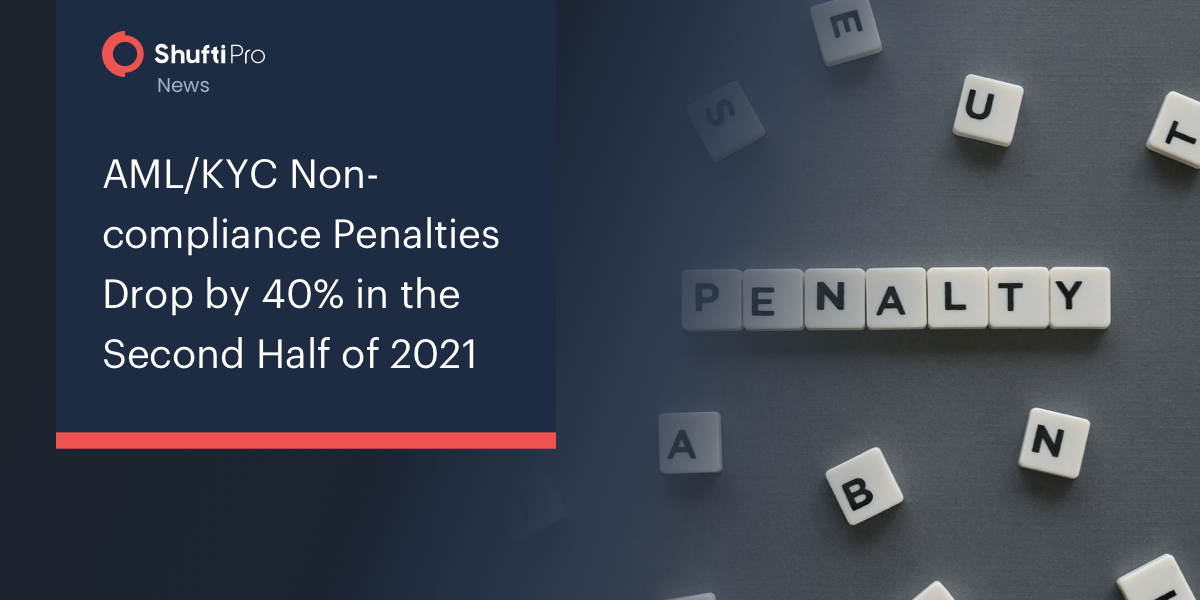News
FATF Removes Malta From gray List of Untrustworthy Financial Jurisdictions
After one year of being included in the FATF grey list, the global action committee has voted Mal...
 Explore More
Explore More
News
Australian Defense Department Hit by Ransomware Attack
Australian Defence Department has been hit by a ransomware attack. No information about former or...
 Explore More
Explore More
News
MBSB Bank to Implement BNM’s Requirements for Combating Financial Crimes
Bank Negara Malaysia announced additional security measures for financial institutions to strengt...
 Explore More
Explore More
News
Swiss FinTech Firm LeonTeq ‘Strongly Refutes’ Allegations of Suspicious Transactions
Swiss FinTech firm LeonTeq has rejected allegations of suspicious transactions with possible link...
 Explore More
Explore More
News
CBN Issues AML/CFT/CPF Guidelines for Licencing Banks and other Financial Institutions
The Central Bank of Nigeria (CBN) has issued guidelines to assist promoters of banks and other fi...
 Explore More
Explore More
News
Ramon Abbas, Nigerian Instagram Influencer Pleads Guilty to Million-dollar Fraud
Nigerian instagram influencer, Ramon Abbas (Hushpuppi), admitted that he was involved in a conspi...
 Explore More
Explore More
News
FCA Emphasises on Companies to Invest in Compliance Program
The U.K’s financial crime investigation agency is now taking steps that will involve the companie...
 Explore More
Explore More
News
Businesses at Risk Due to 6AMLD by the European Union
The European Union imposed the fifth anti-money laundering directive in January 2020, which enhan...
 Explore More
Explore More
News
The United Kingdom implements new Anti-Money Laundering regulations
The United Kingdom’s finance and economics department has announced the incorporation of new Anti...
 Explore More
Explore More
News
FinCEN Says Russia Cannot Evade Sanctions with Crypto
Global lawmakers are taking a closer look at digital assets and how they can or cannot be used to...
 Explore More
Explore More
News
Bank of Spain Issues New Cryptocurrency Regulations
Virtual asset service providers, banks, and other financial institutions are now required to regi...
 Explore More
Explore More
News
“The Community” Fined $120M for Multi-million Cryptocurrency Theft Scheme
A sixth member of “The Community” was sentenced to 10-month imprisonment and over $120,000 fine f...
 Explore More
Explore More
News
US Department Of Justice Announces Enforcement Actions to Regulate Cryptocurrency
The US Department of Justice (DOJ) announced several enforcement actions against cryptocurrency a...
 Explore More
Explore More
News
EU Parliament to Consider Black-Listing Switzerland After Credit Suisse Leaks
The European Parliament’s main political group called for a review of Switzerland’s banking pract...
 Explore More
Explore More
News
AUSTRAC to Audit Three Bell Financial Group Entities to Evaluate AML/CFT Compliance
AUSTRAC has called for the audit of three entities under the Bell Financial Group, including Bell...
 Explore More
Explore More
News
Cambodia Exits FATF Anti-Money Laundering Gray list, Philippines Remain
The global watchdog has removed Cambodia from its list of jurisdictions under increased monitorin...
 Explore More
Explore More
News
South Africa Earmarked R265 Million to Get Off FATF’s Greylist
Finance Minister Enoch Godongwana announced on Tuesday that allocating R265 Million is one of sev...
 Explore More
Explore More
News
Russians Turn To Crypto As the West Imposes Financial Sanctions
Data has shown that Russians are turning towards transactions in cryptocurrency as a result of we...
 Explore More
Explore More
News
Alfa-Bank to Offer Blockchain-Based Services for the Self-Employed People and Freelancers
Alfa-Bank is one of the largest private commercial banks in Russia which is exploring blockchain-...
 Explore More
Explore More
News
IRS Deploys Effective Filters to Detect and Prevent Tax Evasion
The Treasury Inspector General for Tax Administration released an interim filing season report on...
 Explore More
Explore More
News
MEPs Disclose Plans To Crack Down On Money Laundering – AMLA Reports
The civil liberties and economic affairs committees discussed the plan to establish an EU Authori...
 Explore More
Explore More
News
IMF Urges Central Bank of Seychelles to Upgrade Transparency and AML Controls
The Central Bank of Seychelles (CBS) has been advised by the International Monetary Fund (IMF) to...
 Explore More
Explore More
News
1.6M Unemployment Claim Filers Exposed Due to Data Breach
The Washington State Auditor’s Office has investigated an incident that has exposed the personal ...
 Explore More
Explore More
News
UAE Regulatory Authority Enforces Import Invoice Verification to Fight Trade-Based Money Laundering
United Arab Emirates (UAE) has implemented the latest compliance regulations for importing commod...
 Explore More
Explore More
News
US Regulators Worried about the Rise in Synthetic Identity Fraud
Synthetic identity fraud, a financial crime in the USA, is on the rise. This has concerned the Un...
 Explore More
Explore More
News
Bermuda Monetary Authority Tightens AML Control as Threat of Money Laundering Increases
Bermuda Island was rated high in the 2020 Money Laundering and Terrorist Financing Risk Assessmen...
 Explore More
Explore More
News
Nigeria, Myanmar, and Türkiye Take Effective Steps to Meet FATF Recommendations
Myanmar, Nigeria, and Türkiye are implementing effective measures to level up anti-money launderi...
 Explore More
Explore More
News
ML/TF Legislation for Art Industry Labeled ‘Damaging and Unjust’
Cinoa, the international art & antiques dealers’ association has issued an open letter signed...
 Explore More
Explore More
News
China’s securities watchdog commits to clean up financial markets
SHANGHAI – China’s security watchdog vowed a number of measures to clean up its financial m...
 Explore More
Explore More
News
FATF to Blacklist Uganda Over Money Laundering
The Executive Director of the Finance Intelligence Authority, Sydney Asubo stated that the FATF h...
 Explore More
Explore More
News
UK’s financial system claims to survive Coronavirus hit
Britain’s banks inform investors that they are optimistic that their balance sheets are strong en...
 Explore More
Explore More
News
Dutch Central Bank Strikes Coinbase with €3.3 Million Fine over Anti-Money Laundering Failings
The Dutch Central Bank (DeNederlandscheBank) has charged Coinbase for having ineffective anti-mon...
 Explore More
Explore More
News
NGOs Advised on Due Diligence to Tackle Terrorism Financing
The Financial Crimes Commission’s SCUML has advised Non-Governmental Organizations (NGOs) to cond...
 Explore More
Explore More
News
South Africa Enforces New Rules to Transfer Funds Abroad
The South African Revenue Service (SARS) has made regulatory changes to transfer funds overseas, ...
 Explore More
Explore More
News
United States Senate, UAE Government, and Spain Make Significant Efforts to Curb Money Laundering and Terrorist Financing Activities
United States Senate, UAE Government, and Spain Take effective measures to amend current Anti-Mon...
 Explore More
Explore More
News
Facebook and LinkedIn follow Twitter’s suit demanding Clear view AI to stop scrapping user images
The previous month, after NewYork Times’ critical report on the facial recognition tech of Clearv...
 Explore More
Explore More
News
Singapore Police Warn Citizens of Prevailing SMS Phishing Scams
The Singapore Police Force has warned citizens about SMS fraud targeting people with similar send...
 Explore More
Explore More
News
South Korea’s Telecom Giant to Introduce Blockchain Wallets for Official Documents
SK Telecom, a South Korean telecom giant, has announced its first e-wallet for digitally storing ...
 Explore More
Explore More
News
Swiss Govt. to Amend Banking Act for Press Freedom in Finance Sector
The Swiss Government has signaled to amend the banking act for press freedom in the finance secto...
 Explore More
Explore More
News
UAE Adopts Facial Recognition for ID Verification Instead of Emirates ID Card Readers
Facial recognition instead of Emirates ID card readers will now verify identity.
The Federal Auth...
 Explore More
Explore More
News
Reserve Bank of Zimbabwe Reveals Most Banks Lose Correspondent Deals Due to AML Non-compliance
The Reserve Bank of Zimbabwe (RBZ) Deputy Governor disclosed that most banks are losing clients d...
 Explore More
Explore More
News
Singapore Seizes $736m Worth of Assets in Money Laundering Investigation
Singapore police have arrested 10 foreigners in the money laundering operation and seized $736m w...
 Explore More
Explore More
News
Financial Watchdogs in Thailand Issue Strict KYC for New Crypto Accounts
The government in Thailand plans to eliminate anonymity in the new crypto account creation by enf...
 Explore More
Explore More
News
New Crypto Regulations to be Followed by Korean Banks
South Korea is increasing cryptocurrency regulations by making KYC verification necessary along w...
 Explore More
Explore More
News
Mauritius to Step Out of FATF Gray List Following Key Regulatory Changes
Mauritius, which was previously known for being a tax haven, might be out of the FATF’s grey list...
 Explore More
Explore More
News
Money Laundering Proceedings Against Pilatus Set Back Indefinitely
Money laundering proceedings against Pilatus Bank and its former top officials will likely be set...
 Explore More
Explore More
News
Americans ‘work from home’ strategy present new targets for hackers
Coronavirus outbreak has forced organizations to let their employees work from home during the ou...
 Explore More
Explore More
News
New York Financial Department Releases Guidelines On Dollar-Backed Stable Coins
The New York Financial Department has released “Guidance on the Issuance of U.S. Dollar-Backed St...
 Explore More
Explore More
News
Malta’s Justice Minister Ammends Legal Framework to Lighten Financial Crime Proceedings
Malta’s Justice Minister announces amendments in the court proceedings for financial crimes...
 Explore More
Explore More
News
Turkey at Risk of Becoming a Haven for Russian Sanctions
Turkey is facing rising pressure for compliance with sanctions imposed on Russia and to increase ...
 Explore More
Explore More
News
RBI to Strengthen KYC Guidelines for the Crypto Industry
IndiaTech has suggested enhancing the KYC guidelines and obligating the cryptocurrency industry t...
 Explore More
Explore More
News
Facebook’s Calibra rebrands to Novi wallet
Facebook subsidiary and Libra wallet provider Calibra, has recently been rebranded to Novi. The n...
 Explore More
Explore More
News
Man Arrested For Stealing Identities, Funding 1800 Online Gambling Accounts
The man suspected of stealing other’s identities to create online gambling accounts has finally b...
 Explore More
Explore More
News
India to Impose $2.65M Fine and Jail for Violating Cryptocurrency Bill
India’s financial watchdog has proposed a new crypto bill to impose a $2.65M fine and jail for vi...
 Explore More
Explore More
News
NSW Government Introduces New Money Laundering Laws To Combat Organised Crimes
The New South Wales government add new laws to increase the security against the criminal gangs ...
 Explore More
Explore More
News
FinCEN Proposes Extension in Suspicious Activity Reporting Rules
The US Financial Crimes Enforcement Network (FinCEN) issued a Notice of Proposed Rulemaking (NPRM...
 Explore More
Explore More
News
UAE Central Bank Fines Firm $490,000 for Violating AML/CFT laws
The UAE’s Central Bank has charged a financial firm Dh1.8 million ($490,000) over breaching the c...
 Explore More
Explore More
News
Abu Dhabi Regulatory Authority Fines Pyypl $486,000 for Violating Money Laundering Laws
Abu Dhabi Global Market (ADGM) financial regulatory authority fined $486,000 to digital UAE bank ...
 Explore More
Explore More
News
The EU and UK Announce Major Regulatory Reforms to Safeguard Crypto-Assets
EU implements unified crypto-asset regulations, MiCA, and incorporates Travel Rule to secure cryp...
 Explore More
Explore More
News
Major US Twitter accounts hacked in Bitcoin scam
Billionaires Elon Musk, Jeff Bezos, Barack Obama, Joe Biden and Bill Gates are among the many US ...
 Explore More
Explore More
News
FCA Warns Against Unregistered Crypto ATM Use
The Financial Conduct Authority (FCA) has begun taking action against unauthorised crypto ATMs in...
 Explore More
Explore More
News
AML and Crypto Fines Surge to £4bn in Regulatory Crackdown
The global AML fines surged 53% in 2022, while crypto fines rose over 90% as regulators cracked d...
 Explore More
Explore More
News
UK Regulatory Authorities Warns Crypto Firms to Comply with Latest AML Obligations
The UK regulatory department, Financial Conduct Authority (FCA), has warned cryptocurrency platfo...
 Explore More
Explore More
News
Singapore and Europe Enhance AML Framework to Fight Financial Crimes Effectively
Singapore and Europe have emerged with enhanced AML requirements for corporate services businesse...
 Explore More
Explore More
News
UAE Arrests Gupta Brothers As Part of Efforts to Combat Money Laundering
The UAE has arrested the internationally wanted Gupta brothers who were charged for money launder...
 Explore More
Explore More
News
£78 Million Stolen in Investment Scams, Warns FCA
FCA- Financial Conductive Authority has given out a warning as the investment scams regarding ‘cl...
 Explore More
Explore More
News
UAE Issues Updated Targeted Financial Sanctions Guidance
The UAE has shifted from the multilateral United Nations Security Council (UNSC) sanctions to uni...
 Explore More
Explore More
News
AML/KYC Non-compliance Penalties Drop by 40% in the Second Half of 2021
KYC/AML non-compliance penalties have dropped by 40% in the second half of 2021. However, this do...
 Explore More
Explore More
News
TD Bank Agrees to Pay USD 1.2 Billion to Settle Investor Lawsuit
Toronto-Dominion Bank has agreed to pay US $1.2 Billion to settle an investor lawsuit which claim...
 Explore More
Explore More
News
US Takes Steps to Regulate Digital Currency Amid Russian Sanction
President Biden signed an executive order on Wednesday wherein the federal government was urged t...
 Explore More
Explore More
News
AUSTRAC Hits Military Bank with Enforcement Action to Ensure AML Compliance
The financial regulator in Australia has hit the Australian Military Bank with implementation act...
 Explore More
Explore More
News
AUSTRAC, Home Affairs Say Tech Capability Not There Yet for Crypto Travel Rule
While it is understood that the crypto Travel Rule will prove to be a ‘game changer’,...
 Explore More
Explore More












































































